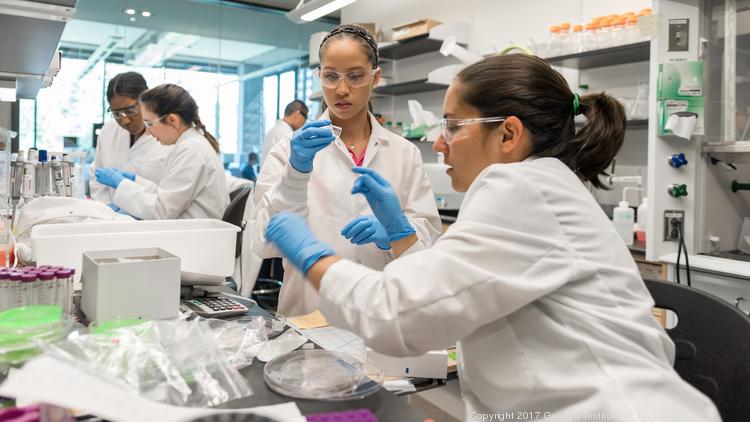News Posts List
Georgia Tech-led group gets $20M federal grant to fund biomedical engineering research center
09/13/2017
A Georgia Tech-led research consortium received a nearly $20 million National Science Foundation grant to fund a new engineering research center.
The NSF Engineering Research Center for Cell Manufacturing Technologies (CMaT) will develop tools and technologies to help clinical facilities reproducibly manufacture efficient, safe and affordable cell-therapy products, Georgia Tech said in a statement.
The Georgia Tech-led CMaT lab
ROB FELT
Examples of these highly promising therapies include T cell-based immunotherapies for blood cancers and a gene-modified stem cell therapy recently approved in Europe for a form of the so-called “bubble boy” syndrome.
Unlike pharmaceuticals and other products now used in medical treatments, cells are living entities whose properties can change depending on the way they are grown, stored or manipulated, CMaT Director Krishnendu Roy said in the statement.
“The center will develop new engineering tools and scalable methods to better characterize, expand, differentiate, separate, transport and store high-quality cells so they provide consistent therapeutic effects, allowing them to be used in standardized therapies by clinicians to serve large numbers of patients worldwide,” Roy said.
CMaT will develop models for a supply chain, storage and distribution system for these therapeutic cell products. The public-private initiative will also help develop a skilled bio-manufacturing workforce through education and training activities at the K-12, technical college, undergraduate, graduate and postdoctoral levels.
The Georgia Tech led partnership includes the University of Georgia, the University of Wisconsin-Madison and the University of Puerto Rico, Mayaguez Campus. Affiliate partners include University of Pennsylvania, Emory University, the Gladstone Institutes and Michigan Technological University.
CMaT is expected to speed up the development of new therapies and the testing needed to bring them into the clinic, said Steven Stice, director of the University of Georgia’s Regenerative Bioscience Center.
Regenerative medicine applications could offer new ways of treating diseases for which there are now essentially no treatments, including Parkinson's, Alzheimer’s, heart disease and stroke.
“There are a significant number of cell therapy clinical trials and investments in the field,” Stice noted. “But there is little or no investment in a set of consistent standardization methods to optimize how these therapies should work."

